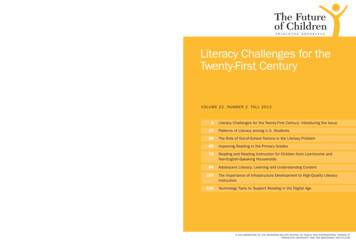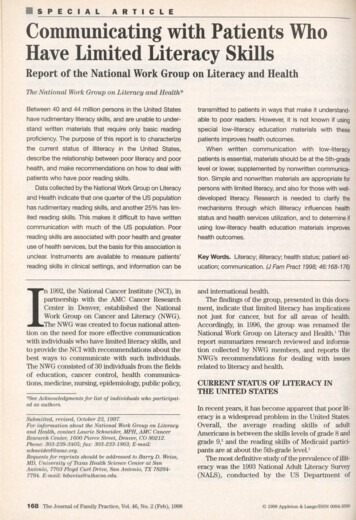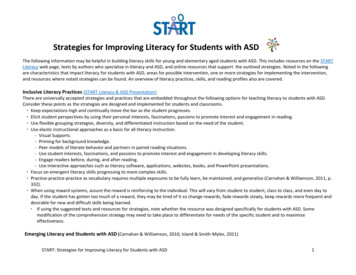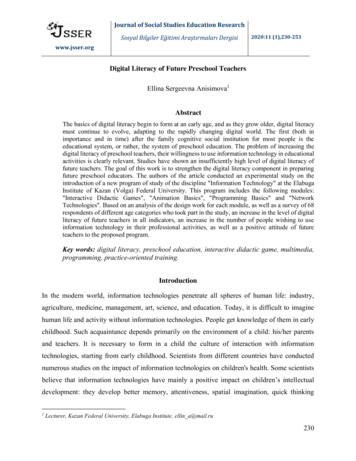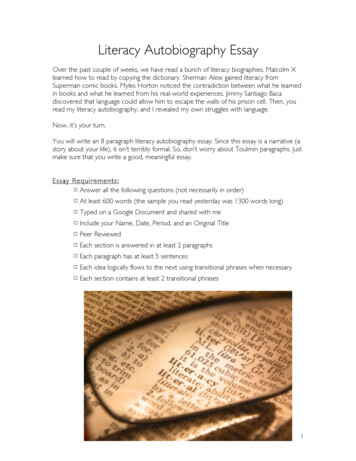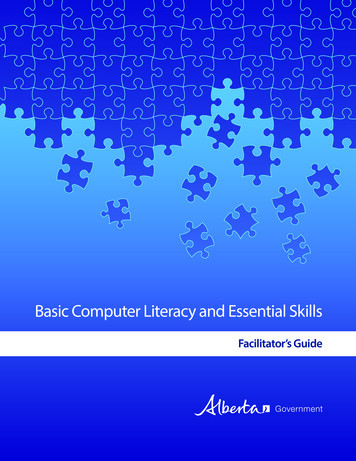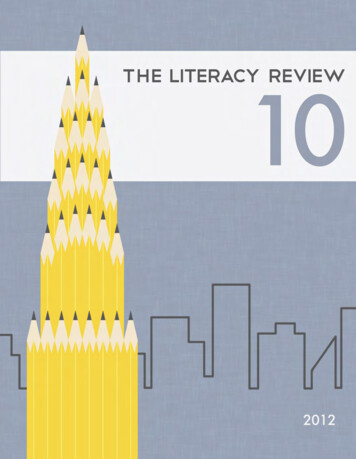
Transcription
A Gallatin Writing Program PublicationNYU Gallatin School of Individualized Study1 Washington Place, New York, NY 10003A Gallatin Writing Program PublicationThe Literacy ReviewAn annual journal of writing by adult students in English forSpeakers of Other Languages, Basic Education and GeneralDevelopment Programs in New York CityEDITOR IN CHIEFStephen A. BrownEDITORSJenessa AbramsLauren BerningerKristi BerryWeronika JanczukTara McCauleyDESIGNERJourdan EnriquezPHOTOGRAPHERSSite Photos: Lara Blackman, Lis Carney, Rachel WebbPortraits: Lara Blackman, Amanda KnudsenEDITORIAL BOARDJacqueline Allen, Vivienne Bang, Lara Blackman, Gilmarie Brioso, Ryan Casey,Rebecca Cloyd, Safia Elhillo, Jourdan Enriquez, Safiya Farquarson, James Gain,Beth Gibson-Borisoff, Nadege Giraudet, Gina Hong, Sam Hong, Stacy Hwang,Farzana Khaleda, Daniel Kopin, Tammy Lam, Josue Ledesma, Eileen Liang, CharlesLin, Jessica Littman, Egle Makaraite, Annabelle Maroney, David Maruzzella,Amanda Phillips, Christina Sandman, Julia Schachnik, Lynette Sieger, CarinaTurchioe, Lauren Walter, Rachel Webb, Phillip YakushevEDITORIAL AND VISUAL CONSULTANTSEvan CommanderMolly KleimanADVISORJune Foley, Writing Program Director
Thanks ToGallatin DeansSusanne Wofford, Dean of the Gallatin SchoolLisa Goldfarb, Associate Dean for Faculty and Academic AffairsGeorge Shulman, Acting Associate Dean for Faculty and Academic AffairsLinda Wheeler Reiss, Associate Dean for AdministrationKimberly DaCosta, Associate Dean of StudentsGALLATIN WRITING PROGRAM FACULTY COMMITTEEStacy Pies and Greg Erickson, ChairsLisa Goldfarb, Sinan Antoon, Millery Polyné, Sara Murphy, A.B. Huber,Hannah Gurman, Myisha Priest, Andy Romig, Marie Cruz Soto,Ethan HarknessKIMMEL CENTER for University LifePamela Bolen, Director of OperationsCONSULTANTSEditorial: Taylor Antrim, Adjunct Faculty, the Gallatin SchoolDesign: Lise Friedman, Adjunct Faculty, the Gallatin SchoolPhotography: Beowulf Sheehan, Alumnus, the Gallatin SchoolContacts At sites shown in section divider photographsHaniff Toussaint, Literacy Advisor, Brooklyn Public Library, Bedford AdultLearning CenterTerry Sheehan, Literacy Advisor, New York Public Library, Seward ParkCenter for Reading and WritingWendy Wen, Instructor, New York City Department of Education, BronxAdult Learning Center at PhippsSPECIAL THANKS for generous contributions to fundingLisa Kail, Assistant Director, NYU Office of Civic EngagementClaire Morris Stern, Gallatin, B.A., 1989; M.A., 1998
CONTENTSINTRODUCTION to 10TH ANNIVERSARY VOLUMESome Favorite Works from Volumes 1 through 9LIVING IN NEW YORK CITYXuemei Zou First Impressions of Chinatown26Josue Nieves Spilling My Guts: 20 Years at the Meat Market28Nikolay Malevanay My Rockaway Neighborhood30Darling Ojeda The Q6631Salome Rodriguez When You Are in My Car32Grace Guo A Snowy Day33Jeanette Chawki A Parrot and the Police35Li Zhou I Can Practice Falun Dafa Freely36Growing upWillie Hoskins Shooting at Me40Yuk Yee (Jay) Chan Fung Childhood in a Factory in Macau41Victoria Kiminta My Grandfather’s Farm in Kenya43Roy Hendricks Sugar Cane Adventures45Anthony Burnett Summers at Grandma’s46Humberto Ayuso From Puerto Rico to New York48Isabella Hurtado My Doll Collection49Maria Lopez A Strange Way to Make a Friend51
Passing DownJulio Rodriguez The Aroma of Tobacco54Macourani Doumbia Abdoulaye and Miriam55Alena Vysotskaya A Detective Story57Hassan Bouimsiln The Race58Angelica Pazmino Day of the Little Candles60Angela Valencia My Black Shoes62Onica Leitch-Edinboro A Night to Remember63Awilda Correa The Voldadora65QuestioningWalter Wan Beyond Babel70Lily Haripersaud Strength, Faith and Sadness72Luis Marin The Flamingos’ Story74John Douglas Socks76Tamara Tsankashrili Where Is Safe?77Junior Corniffe A Changed Hero79Mahvash Mahboubi The Christmas Gift81Finding encouragementNelcy Ramirez I Am From.86Vasyl Barabash Was My Soul on the Moon?87Anna Cieslik Friendship88Ana Duran A Safe Place89Roma Richardson The Unknown90Fatou Fofana As a Young Lady91
Mamadou Diakhate You Are Not Alone93Gaining PerspectiveLuz Goodridge Miss Peru96Maria L. Rivera Where Is My Cigarette?97Quisquella De Jesus It Is Not Andrew’s Divorce99Sonia Nunez One of My Craziest Experiences101James Durr An Out-of-Body Experience102Gladys Mei Yue Lam Worker Education104Rosny St. Fleurant City and Country106Ariana Ibarra-Taboada A World Apart: My Early Education108PerseveringIntesar Before Sleeping112Ana Lucia DeSouza One Moment That Saved My Life113Oswaldo Rodreguez A Boy Named Jenny115Samantha Bonilla Something I Want You to Know about Me117Shameka Lambert A Day to Remember118Yudong (Eugene) Zhang Finding My Voice119Sharon Gentles Reflecting on My Life120Rosa Diaz The Dreadful Year122Felicia Thomas The Most Interesting Person I Met This Year124CelebratingDivinia Hernandez My Best Christmas Present128Miryam Awute My Greatest Birthday130
Beny Rodriguez Beautiful Tears132Magdalena Sosa A Very Special Dinner133Lucy Liu My Sweet Family Dinner135Yela Noboa “Happy Birthday to You”137AppreciatingAmgad Seidi Trees142Shuxia Wang I Will Love You Forever143Bernice Bristol-LaRoc In Honor of My Mother145Adjowa Maglo A Tribute to My Sister146Marion Burris I Just Want to Say Thank You148Luis Guerra Building My Confidence150Yanming Liang Freedom152Wilawan Thirapatarapong My Teacher154Natalia Pankratova Study for a Hundred Years155Dilek Ustun Ozlap Write If You Can!157
INTRODUCTION TO THE 10TH ANNIVERSARY VOLUMEWhile planning the 10th-anniversary volume of the Literacy Review, the editors had thepleasure of looking back on the previous nine compilations, from Volume 1, with 36writers at 14 sites, to Volume 9, with 76 writers at 50 sites. Here, we are delighted toreprint a favorite of the editors from each volume, with an update on the author.Volume 1: “Our Grandmother’s Trunk,” Sergio RojasQueens Library, Steinway Adult Learning CenterVolume 2: “The Silver and White Hair,” Joseph RisiNew York Public Library, Tompkins Square Center for Reading and WritingVolume 3: “Yum Cha and New Yorkers,” Lisa LeeUniversity Settlement Society, Adult Literacy ProgramVolume 4: “About My Name,” Julius WalkerBrooklyn Public Library, Central Adult Learning CenterVolume 5: “An American Dream: Spa, Nails, & Music,” Temuri AkhobadzeNew York Public Library, St. Agnes Center for Reading and WritingVolume 6: “Best Friends,” Derek ScottFortune Society, Education ProgramVolume 7: “Dinner at My House,” Kyaw HtetCollege of Mount St. Vincent, Institute for Immigrant ConcernsVolume 8: “The Three Lorenas,” Lorena DeloyaCUNY, City College, Adult Literacy ProgramVolume 9: “The Sound of Music,” Sandra GuzmanNew York City Department of Education, Bronx Adult Learning Center at Phipps
Sergio RojasOur Grandmother’s TrunkPast Selections - Volume 1OS ergio Rojas8ur grandmother had an old truck that she jealously guarded. It had amagical aura in the infant eyes of my little sister and me. It looked likea treasure rescued from a pirate galleon. She kept it inside a wardrobe and openedit with a key that only she had access to, so we didn’t get to know its contents. Inspite of many frustrated attempts, the little we could find out was that its interiorwas lined with red velvet, and from that box came the candies which were offeredto us at situations that she considered appropriate.A little woman, with small and tired steps, she came out from her almostalways semi-dark room, bringing with her the most delicious candies that wecould imagine, a motive for celebration on our part.Our grandmother was very religious, but she became even more devoutafter our grandfather died. She prayed the rosary every day, kneeling down on akneeler in front of a small altar with the Virgin of Copacabana’s image. Her longworship touched and saddened me. Sometimes I tried to accompany her, but thepain in my skinny knees betrayed those attempts. Her room smelled of incenseand Holy Week palms, emanating the peace that one feels when entering into thechurch and at the same time a mysterious feeling.During school vacation, while we were playing, we never stopped observingher. We saw her in her room among the embroideries she made, the faith shepracticed and the trunk she kept. Later at dusk, she left the house wearing a blackcoat she used to go to church. In reality, the only thing out of our control (but notoutside of our fantasies) was the content of that enigmatic box.So the time passed: My grandmother continued her disciplined routine,my little sister became more dedicated in trying to imitate every living creaturethat crossed her path, and I committed to reading comic magazines.One day our grandmother woke up sick, and in less than a month shedied. It didn’t take long before we found the key to the trunk on the table; ourparents simply had left it there. Without wasting the opportunity, I opened the
trunk in the presence of my young and curious accomplice.What we found within the ordered compartments of the trunk was: a Biblepreciously bound in leather; some jewelry that belonged to our grandparents; a boxwith gold coins, in addition to many others of silver, coined during the Spanishcolonial times, surely at La Casa de la Moneda of Potosi; and a porcelain dish withcandles. Without doubt, our discovery was worthy of our surprise. But it wasn’tthe same. Our grandmother had taken with her the most valuable thing: a lovedpart of the magic universe of our infancy.Past Selections - Volume 19sergio rojasSergio Rojas wrote this essay while attending the Queens Public Library’s Steinway AdultLearning Center. He also published a poem, “Citizen Birds,” in Volume 2. Tsansiu Chow,the literacy center manager, reports that Serio Rojas graduated in 2004. The last time thetwo gentlemen met was in September 2005, when Sergio Rojas came to say hello and, asa proud father, show his teachers his infant son, Alejandro. Tsansiu Chow adds: “His sonshould be in the first grade now.”
Joseph RisiThe Silver and White HairPast Selections - Volume 2MJ oseph risi10y grandmother, Carmela Risi, from Naples, Italy, used to wash her hairin the big kitchen sink. Her hair filled the whole basin, then spilledover the side. When she finished, she went to dry it outside the window. Her hairwas very long. It was at least five feet long. It covered the brick wall outside thewindow. I remember watching her drop her hair down from the window andthinking how the heck she would get it all back inside. Then I saw how she did it.She put a towel under her hair and pulled it in.After she dried it, it smelled like fresh flowers in a garden. And why?Because she made her own soap. Later, she would brush her hair at least 15 times anight. Then she would go to sleep. In the early morning, she would get up aroundsix am to start fixing her hair. It took two hours or more to brush it. Then shestarted to braid it. She put a white ribbon on the bottom of her hair to hold ittogether. Then she started to roll it and rolled and rolled until she stopped. Thenshe put it in a bun with a comb that was made in Italy. Her hair looked like a bigbagel all rolled up. And then it was finished for the day until the nighttime came.Then she would start all over again. When I was a little boy, I used to go behindmy grandma and try to take out the comb. But she said, “Get out from there!” Thecomb was stuck so hard it did not move. Then I thought it was stuck in her head,not her hair.Today, when I close my eyes, I can see that comb clearly. It was black andsilver with little stones that shined like diamonds.Joseph Risi, born in Brooklyn, has studied at the New York Public Library’s Tompkins SquareCenter for Reading and Writing. Site advisor Terry Sheehan writes: “When Joseph first pickedup that volume of LR, he said, ‘This book looks like it will last a long time. I want my son tohave it his whole life.’ At that time, his son Joshua was nine and proudly brought the book toschool, where his teacher asked him to read his dad’s story aloud. Joseph said attending classalso made him feel more confident in taking his son to the library and museums. He is proudthat Joshua, now almost 17, is a good student.”
lisa leeYum Cha and New YorkersYPast Selections - Volume 311L isa leeum Cha, to drink tea, is one of the traditional habits or entertainments ofthe people of South China, especially in Guangdong Province and HongKong. Yum Cha is not only drinking tea, but is accompanied by many kinds of dimsum to eat. I have worked in a Chinese restaurant for a long time. As regards YumCha, I found that New Yorkers have changed from confusion about it to acceptingand now to enjoying it.In the first half of the last century, New Yorkers knew very well aboutchop suey, won ton soup (or egg drop soup), egg rolls and chow mein with ducksauce. If they drank tea, they would put a lot of sugar in it. They thought that wasgenuine Chinese food. They liked it because it was cheap and tasted not bad.After 1975, many Chinese people emigrated from China and Hong Kong toNew York or other cities. The newcomers have their own styles of life and values.Actually, their ideas and customs have influenced the Chinese community in NewYork. Yum Cha became one of the popular entertainments in Chinatown. NewYorkers were very curious to know about Yum Cha.From 8 a.m. to 4 p.m. is the time for Yum Cha in Chinese restaurants.People come with their families, relatives or friends to eat, to drink tea and talk;merchants can confer about business while they are eating dim sum and drinkingtea. At this time, the restaurant’s hall is noisy and hilarious. When New Yorkerscome to Yum Cha, some of them dislike it because they feel as if they are eatingand drinking in a market, but more New Yorkers think it is natural and free. Theyfeel as comfortable as at home. Moreover, the waiters and waitresses serve you.Some managers or clerks working on Wall Street choose Yum Cha at lunchtime,because it is an appropriate way to relieve their tense nerves. Some people evenhold their birthday party or retirement party at Yum Cha time. They think Yum Chais a wonderful entertainment for their guests.Chinese people believe that tea can dilute the grease inside the stomachand is good for health. So restaurants have many kinds of tea, such as Po Nie,Lung Ching, Wulung and flower. New Yorkers are used to drinking cold water,soda, beer, or tea with sugar. But now they know the advantage of drinking tea,
Past Selections - Volume 3so more of them change their habits and order tea. They like green teas morethan the brown tea, Po Nie. Some New Yorkers ask the waiters to teach them thedifferences among various teas and how to make them taste better, because teahas aroused their interest in Asian eating and drinking.In the beginning, New Yorkers were confused by so many kinds of dimsum. They didn’t know the names and ingredients of each kind. They dared nottry and also did not want to waste their money. They needed to ask the waiter orwaitress to choose for them.L isa L ee12A boss of a Chinese restaurant printed a picture of the samples of variousdim sum and identified them in English, such as Shrimp Har Kow, Pork Shui Mai,Pan Fried Turnip Cake, Stuffed Green Pepper with Shrimp. That is a great help toNew Yorkers. Now they are sure what they want. Their big favorites are deep friedfood or steamed food. Some can speak fluently in Chinese tones, “Har Kow, ShuiMai.” Quite unlike Chinese people, New Yorkers are devoted to their favorite dimsum and eat heartily. I know a customer at our restaurant who likes to eat DeepFried Bacon Shrimp Balls (one order has eight balls). Every Saturday at 11 a.m. hecomes to eat two orders of them, because at this time the Bacon Shrimp Balls arefresh and crisp. Once we advised him not to eat that much deep fried food. Hepicked up one ball and said, “It is my beloved.” Then he patted his stomach. “Let itstay here with me.”For payment, New Yorkers like each person to pay for himself or herself,or share the bill together. But Chinese people like to be the payer. Sometimes theyfight to be the one to pay the bill. New Yorkers are amazed at the fighting. A NewYorker sighed. “I wish someone would fight to pay my bill.”Different nations have their own cultures, customs and ways of eatingand drinking. People of many nations live in New York. They learn Americanculture and customs, but also keep their own. New Yorkers are lucky. They havean exceptional chance to benefit from many other nations’ cultures and customs,to make their life abundant.Born in China and a graduate of Sun Yat-sen University, Lisa Lee studied in the advancedwriting class of the University Settlement Society’s Adult Literacy Program, which is directedby Michael Hunter. She and her husband, Wah You Lee, who was a teacher in China, andalso studied in the advanced writing class, were each published in three volumes of theLiteracy Review. Both senior citizens now, last year they went on a three-month trip toChina. Lisa Lee volunteers often at a senior citizen center, and she enjoys reading books—inEnglish as well as Chinese.
julius walkerAbout My NameJPast Selections - Volume 413julius walkerulius is my name. Oh, I struggled to accept the name as a child coming up.They never pronounced my name properly. “Judas!” they would call out.“You killed Jesus.” When I said, “Stop that,” it didn’t matter. They would continueto shout.It wasn’t until I started secondary school that I learned to see the beautyin my name. When my favorite girl pronounced my name so well, I wanted to hearit again and again.I discovered I was illiterate, but it was too late, because I was about toleave school.Today I am proud of my name. When people ask me my name, I gladly say“Julius.”If it’s an adult and they jeer at me, I realize they’re not grown up. I evenhate being called by my nickname. That’s how much I love my first name. I standtall as Julius! Julius! If anybody calls, that’s my name.Born in Jamaica, Julius Walker studied at the Brooklyn Library’s Central Learning Center.The site advisor, then and now, is Winsome Pryce-Cortes. At the time he was writing, JuliusWalker said, “By my working with the literacy program, they are helping me to get pastdoubt and to find belief in myself.” At the LR 4 celebration, he read “About My Name” withtremendous verve. He successfully moved on to the Brooklyn Public Library’s Pre-G.E.Dclass, then the G.E.D. class and is now employed by UPS.
Temuri AkhobadzeAn American Dream:Spa, Nails & MusicPast Selections - Volume 5PT emuri akhobadze14laying concerts and teaching students is not a great business. Who needsclassical music today? I was waiting for my rich uncle for many years, but henever showed up. Slight poverty was always after me. But one day my phone rang.“Hello, is this Mr. Temuri?”“Yes, Madame,” I answered.“Hello. My tuner recommended you to me as a piano teacher. Can you teachme? Before you say yes, I would like to tell you that no pianist wants to teach me.The problem is that I have beautiful-looking nails, more than an inch-and-a-halflong, and I absolutely don’t want to cut them. I love music, but I also love my nailsa lot. So what do you think?”“Give me, please, a few seconds, Ma’am,” I answered her quickly. I got aruler and jumped to my Steinway grand. So! The white keys were six inches and theblack keys were four. There was my chance. There was my hope.“Hello, Ma’am, I can do it. I’m sure that I can teach you how to improveyour piano playing with your long nails.”So I started to work very seriously on a special program, finding musicpieces that could be played with long nails.In a few weeks, the lady made a very big step in her“I lovemusic,but I alsolove mynails aplaying. Soon she recommended me to other ladies with evenlonger nails. I learned there are many, many wealthy ladies withlong nails who wish to play piano. They even have their own clubwhere they meet and spend time together.My business went up and up. Very soon I needed to hiretwo assistants. In a few months, I rented a nice place on MadisonAvenue and 67th Street. I named this place “Spa, Nails & Music.”lot.”In the middle of the room sits a big concert grand piano. Anybodycan sit and perform for others.Now I am rich and happy. I like to make other people happy, too. Two times
a week my driver brings me to my library in a fancy Bentley. Here at Saint Agnes Iam improving my English. Now I can donate half a million dollars to my library.Past Selections - Volume 515T emuri akhobadzeTemuri Akhobadze, a concert pianist and piano teacher from the Republic of Georgia,studied at the St. Agnes Branch of the New York Public Library’s Centers for Reading andWriting. Three of his works were published in the Literacy Review. Maida Schwab washis tutor, and Steve Mahoney the site advisor. Temuri Akhobadze now writes: “I am stillhere in New York City, the city I love, which gives me energy and fantasy. As usual, I teachpiano, give master classes and perform in the spring and summer. I am very touched thatyou chose one of my stories.”
Derek ScottBest FriendsPast Selections - Volume 6TD erek scott16he first time I saw what a gun could do firsthand, my best friend and I wereon our way home from school. He was from my neighborhood, and I knewhim all my life. We used to play in the park in our hood when we were five. Hismother and my mother did the same, so he was like a family friend. His mothercame over every day after work to talk to my mom.As we got older, we did different things. I joined a gang. He joined adifferent gang, but we were still cool because we were like family. I rememberstopping people in my gang from fucking him up a lot of times.One time, we saw each other downtown with both our gangs. We actedlike we were fighting, but we were just play-fighting. We would run down oneblock so we could meet to laugh about what we did.He was a good kid, the life of the party. He never had a gun and neverliked to fight or start trouble. He just lived in a place where you had to be in agang, just so you could go to the store and come back with your money, so youcould come outside at night and live to see the next day. That’s why he chose to bein a gang, but in my neighborhood that does not save you for long.On that Friday, we were coming home from school on the train, talkingand laughing about what girls were coming to our houses that weekend. That’sone thing he loved to talk about because he always got all the girls. He was a lightskinned boy with long hair. He always had new clothes, so all the girls loved himand he knew it.We got off the 5 train at West Farms. Like always, we ran down the stairsso that we could see all the girls coming off the train and try to talk to them. Thatday, we both had our gang colors on. People always looked at us like we were crazyor something because we were in different gangs that didn’t like each other.That day when we were walking, we heard some kids saying, “You fuckingCrip-lover,” but that was normal so we didn’t think about it. We started to heargun shots but didn’t run because that was normal, too; it happened all the time.I was thinking, Somebody is just shooting at somebody, but then we heard air
Past Selections - Volume 617D erek scottwhistling like ploom and someone saying, “Shoot him! He’s Crip!”I was like, Are they talking about my friend? So we started running, and Ifell. When I got back up, I saw my friend running and the bullets hitting him inhis book bag. It tore his book bag apart. All his books and pencils came out. Bloodand tissue came out of his chest. The bullets went straight through him. I ran tohim as fast as I could. I was not thinking about the bullets flying in the air. All Iwas thinking about was this person that I loved like a brother was being shot. ButI didn’t know what to do. I never saw someone get shot before. I remember holdinghim in my arms, and he was screaming in pain. He said, “I don’t want to die.”I said, “You’re not going to die. You’re just shot. You’ll be okay.”Why do people lie when something bad is going to happen? I didn’t even mean tolie; the words just came out of my mouth.I remember looking in his eyes, his big brown eyes, and seeing them turnblack. I screamed inside and cried, but no tears came out, and then people cameand pushed me off him. I asked the paramedics if I could go with them, but theysaid no.So I went home and listened for his call. I watched TV with the sounddown low so I could hear his call, but he never called to tell me he was okay. Hismother called, crying, asking me why did I kill her son, why did I let him die?For weeks, on the way to school, I would get on the train and hold thedoor, waiting for him to come, since he was always late. Then I would step off thetrain, embarrassed, and let the train pass. After I got on the next train, I wouldlook out the window to see if he was running to catch the train. I remember I usedto give him the middle finger every time he didn’t catch the train.But he never came, because he was dead.New Yorker Derek Scott was 18 years old when he wrote this story. He lived in the Bronxand attended classes in the Fortune Society’s Education Program. He also participated inan oral history project at the Fortune Society and was working on his autobiography. Histeachers were Eric Appleton, now director of education, and John Kefalas, now teacher/coordinator of Youth Programs. He is now working at UPS, and writes, “My plans for thefuture are to work hard to try to take care of my family.”
Kyaw HtetDinner at My HousePast Selections - Volume 7DK yaw htet18inner is very important in my country. At dinner, we talk to each otherabout work, school and other subjects.In my family, there were six of us: my father, mother, two brothers and onesister. We had a rule: If we were not all present, we couldn’t eat dinner. We had towait until everyone arrived. We solved problems together, and told funny storiesand sometimes listened to my father speak. My mother and I always cooked. Nowthat time has passed, because of the Burmese military government in my country.My father, my sister and I are all politicians.After we became politicians, our family dinners were destroyed. We werealways afraid that the military intelligence would come and arrest us. One night,they came and arrested my father. Now he has been in prison for 13 years forpolitical reasons. In 1999, my sister and I left Burma and escaped to Thailand. Wewere not the only family whose lives were disrupted. Some younger men wereimprisoned, too. Do you know how their families feel? Their children are small.They too will talk about economics and their futures and tell funny stories atdinner—but without their fathers.Since I left Burma, I always remember our family dinners. I often thinkabout my mother and see her face before me; she is alone in my house. When wemeet our friends, we talk about our mothers. Mothers are very important in ourculture.Now I have been in America almost three years. Every night when I gethome from work, I open the refrigerator, take out some prepared food, microwaveit and eat silently in my room. Every day I remember my warm family dinners.Kyaw Htet wrote this essay at the College of Mount St. Vincent’s Institute for ImmigrantConcerns, where Diana Schoolman was his teacher. Then and now, Mark Brik has beenthe education director, and Donna Kelsh the director. Kyaw Htet has been working at afood store near Union Square. For two years, he has been studying at CUNY’s Borough ofManhattan Community College, and next year he will be able to take classes for credit. In2011, his father finally was freed from prison, and in April Kyaw Htet will visit his fatherand family in Thailand.
Lorena deloyaThe Three LorenasMeverywhere. I feel like I am part of one of the biggest cities in the world, which Inever imagined would feel most like home.19lorena deloyaof people walking fast through the street, people pushing me, others just saying acurt, “Excuse me.” In the beginning, I felt stupid walking in New York. It took metime to become a fast-paced person, too.I discovered that walking in New York City is like playing soccer becauseI have to run around and dodge everybody, only with my purse instead of with asoccer ball. I especially like walking in Central Park, with green spaces and peoplePast Selections - Volume 8y travels started from home, my birthplace, a little town in Mexico,where I would play hopscotch with my friends in the neighborhood untilmidnight. In my quiet and friendly town, I could walk to the candy store by myselfto buy my favorite spicy and sweet lollipop. I could walk to school, chatting withmy friends. I did not need a car. In my town, having a car was a luxury. But I couldeasily walk anywhere I wanted to go. Only one thing was missing: my mother.Next came an upside-down place in my life: a sleepy-paced city where Inever imagined I would be. Houston was such a boring place that I could not walkto the store by myself. Nobody walked on the street, and the heat was suffocating.Without a car, you could not go anywhere. There were no tiny peaceful streets forwalking, only big highways for driving. Sometimes I felt like I was living in anisolated place, where I did not have any friends. But my mother’s and my reunionchanged that boring city to a sparkling place. I was lucky because my mother hada car, so I could go to the store and the laundromat with her. When I had to stayin my mother’s house, I used to look out the window for someone or somethinginteresting, but I did not see anything. I missed my life of walking and playing andeating lollipops in my hometown.Finally, I travelled to a great place, my last stop: New York. I had neverbefore seen a fast-paced city. Walking in New York is crazy and a big challenge. Inthe beginning, from the multicolored bright lights on 42nd Street, I could see a sea
Past Selections - Volume 8I hope that one day my mother can travel here and walk with me on thestreet
1 Washington Place, New York, NY 10003 eDiTOr iN chieF Stephen A. Brown eDiTOrS Jenessa Abrams Lauren Berninger Kristi Berry Weronika Janczuk Tara McCauley DeSiGNer Jourdan Enriquez PhOTOGraPherS Site Photos: Lara Blackman, Lis Carney, Rachel Webb Portraits: Lara Blackman, Amanda Knudsen eDiTOriaL BOarD Jacqueline Allen, Vivienne Bang, Lara Blackman, Gilmarie Brioso, Ryan Casey, Rebecca Cloyd .





